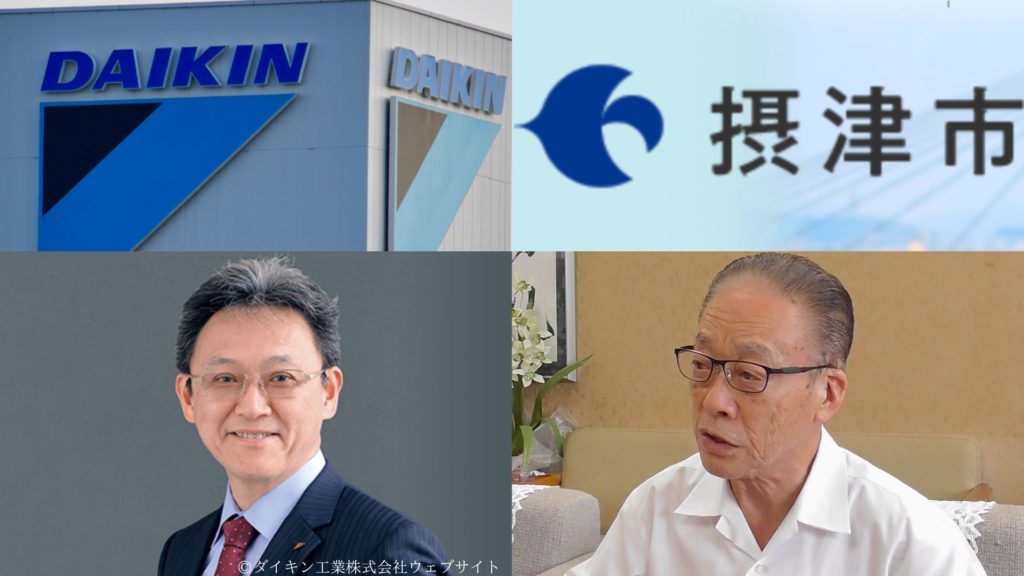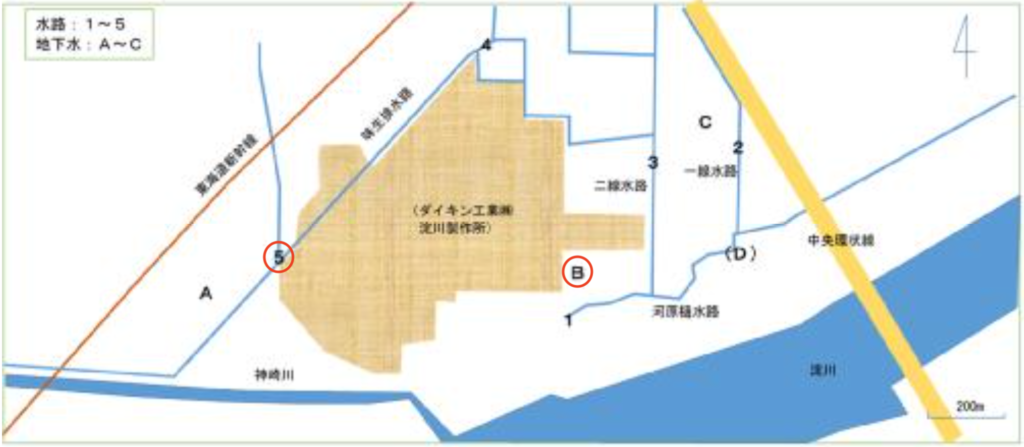90 Minutes with Settsu City Mayor [Part 2] “Daikin Would be in Trouble, If We Keep Doing This Forever.” (27)
2023.02.16 14:28 Nanami Nakagawa
Kazumasa Moriyama (78), the mayor of Settsu City, Osaka, affirmed not to ask Daikin Industries to negotiate compensation for citizens affected by PFOA pollution.
Daikin’s compensation to citizens is stipulated in the “Environmental Conservation Agreement” between the city and Daikin. Based on the agreement, Daikin is prepared to negotiate compensation if the city makes a request.
Why would Moriyama miss this opportunity? In our 90-minute interview, we found out why.

On the left: Executive Officer Yoshiyuki Hiraga of Daikin Industries, Ltd., ready to negotiate compensation for victims / On the right: Kazumasa Moriyama, Mayor of Settsu City, who affirmed not to ask Daikin Industries to negotiate compensation for victims
400 times the target value set by the Ministry of the Environment
On August 29, 2022, editor-in-chief Makoto Watanabe and I interviewed Mayor Moriyama at Settsu City Hall. Staff members from the department in charge were present.
Ryoji Yoshida, General Manager of Living Environment Department
Tomohiro Komohara, Section Manager of Environmental Policy, Living Environment Department
Both Mayor Moriyama and general manager Yoshida said there was no risk of future health hazards to citizens.
However, a nationwide survey by the Ministry of the Environment in 2020 not only recorded the highest concentration of PFOA in the groundwater in the city, but even worse pollution has been revealed since the beginning of 2022.
In January 2022, when the Osaka Prefecture investigated the irrigation canal and groundwater near Daikin Industries’ Yodogawa Plant in the city, it recorded PFOA concentrations that far exceeded the Ministry of the Environment’s survey. According to a survey by the Ministry of the Environment, it was 36 times the target value, but this time the value was as follows.
Irrigation canal: 6,500 ng/l (130 times the target value)
Underground water: 20,000 ng/l (400 times the target value)

The irrigation canal that recorded 6,500 ng was at point 5, and the groundwater that recorded 20,000 ng was at point B. =”Water quality survey results pertaining to organic fluorine compounds (PFOA, etc.) (January 2022),” announced on March 15, 2022 by Osaka Prefecture. (The circle is by Tansa)
In such a contaminated situation, there have been more citizens who have high concentrations of PFOA detected in their blood. Epidemiological studies around the world have shown that exposure to PFOA causes health hazards, but Moriyama and Yoshida insist that “there is no risk of health hazards.”
The definition of pollution issued by the Ministry of Internal Affairs and Communications stipulates that health hazards “include those that may occur in the future.” If the PFOA contamination in Settsu is recognized as pollution, negotiations on compensation for the victims based on the Environmental Conservation Agreement signed with Daikin must begin. Moriyama and Yoshida want to avoid that.
Non-use of groundwater is a “decision of citizens’ own convenience”
However, health hazards are not the only thing that the Environmental Conservation Agreement stipulates as compensation targets. It also covers property damage. Article 15 of the Agreement states:
In the event that pollution occurs due to the operation of the business site and damages the health and property of residents, the business operator shall compensate for the damage in good faith.
In fact, in the vicinity of the Yodogawa Plant, there are citizens who have been unable to use their farmland.
One of them, Masato Yoshii (pseudonym, 70), owns a field next to Yodogawa Plant. He watered his land with underground water and routinely ate crops from his fields such as eggplants, potatoes, and fruits.
In September 2020, Yoshii took a blood test by the team of Akio Koizumi, Professor Emeritus of Kyoto University, that detected PFOA concentration 40 times higher than that of residents in non-contaminated areas. Koizumi believes that groundwater containing a large amount of PFOA passed through crops and accumulated in Yoshii’s body. “I can’t eat any vegetables anymore,” Yoshii said.
I mentioned Yoshii’s case to Mayor Moriyama and pointed out that it was causing damage to residents’ property. Moriyama answered.
“No, there is no damage.”
Director Yoshida also agreed with Moriyama.
“Regarding agricultural water, Settsu City has not been instructed never to use it.”
“I know he thinks so though.”
Instruction he referred to was guidance from the government and Osaka Prefecture. Yoshida was saying that since the government and Osaka Prefecture had not said anything, it was okay for citizens to use groundwater in their fields. Watanabe, the editor-in-chief, confirmed it again.
“As Settsu City, you do not know whether the route of ‘agricultural water → vegetables → exposure through eating’ is scientifically correct. Therefore, it is an individual decision not to use agricultural water, and it cannot be said that it will hinder agriculture. Is that your logic?”
Yoshida said, “yes, at the moment.”
The true intentions of Mayor Moriyama
Director Yoshida said something that pushed the citizens away. Did Mayor Moriyama have the same idea as Yoshid though? Moriyama is the mayor elected by the citizens. When confirming that point, Moriyama said plainly.
“Sure.”
Could he really say that? Wasn’t the Environmental Conservation Agreement that the city signed with Daikin independently made on behalf of the citizens? The agreement states that the purpose is to protect the health of residents and the environment from water pollution.
Why didn’t they see an agreement that could be the starting line for compensation for citizens as an opportunity? When asked about that point again, Moriyama responded.
“We didn’t make it to target Daikin.”
Nonetheless, Daikin said it would respond to negotiations. As the mayor, how could not requesting negotiations with Daikin be an option for the city?
Moriyama answers, “Daikin would be in trouble, if we keep doing this forever.”
Here, I saw Moriyama’s true intentions. Even at this point, they were worried about Daikin.
For Moriyama, the agreement was not an “opportunity” to protect citizens, but rather a “crisis” in which Daikin would be held accountable.
To be continued.
(Originally published in Japanese on September 28, 2022. Translation by Mana Shibata.)
Polluted with PFOA: All articles
 Newsletter signup
Newsletter signup


